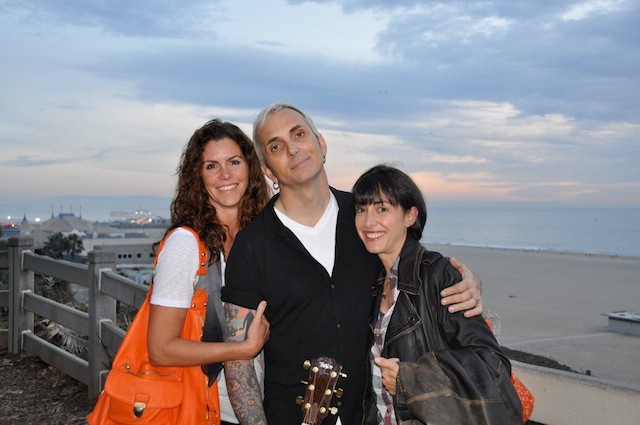I just watched my leading man do an interview about my film on CNN. How on earth did that happen? Just a year ago, I was in the throes of editing 180 hours of documentary footage shot over the course of 18 months. I was not in a fancy editing suite with plates of cut fruit and a fridge full of bottled water outside my door. I was in my editor’s un-air-conditioned, one-bedroom rental in the Hollywood Hills of struggling actors, not movie stars.
CNN.
I am not new to documentaries, but I’d taken a long time off. I’d chosen, despite my feminist upbringing and excellent education, to take some time to have and raise three kids. I felt blessed that I could make this choice — a choice many women before me and today don’t have. But how was I going to jump back in without the film becoming the monster that ate my life? My kids were bigger, but not that big.
Partnership. Cristan Reilly, a long-time friend of mine, brought me the idea of doing a documentary based on the book, “Punk Rock Dad.” She had known the author, the afore mentioned leading man Pennywise frontman Jim Lindberg, as a teenager, and felt his voice was funny and fresh. We both could see it would be an opportunity to explore parenthood through a very foreign prism, which we liked. It had the kind of extreme nature that I think allows for some bigger truths to emerge — truths about the compromises you make when you decide to be a parent. So I agreed to direct, with her as producer.
I couldn’t have done it any other way. I knew she was super organized. She was raising three boys, two of them twins, so knew how to run a very tight ship, and had a real “take no prisoners” attitude. I also knew our values aligned. Neither of us wanted to give up our role as involved parent, so we would make our tiny company work, for the most part, between the hours of 9 to 3. We were there for carpool. We were there for dinner. If business couldn’t wait until tomorrow, it could wait until after the kids went to bed. Our priorities were a given.
And we kept our production lean. There were just three of us on every shoot and in the editing room. We had one run-and-gun camera, a clip-on microphone, and a Mac laptop. We realized pretty early on, when we were getting some interest from studios, that corporate sponsorship could jeopardize the very skittish sub-culture we were infiltrating. There’s nothing a punk likes less than a big corporation. We committed to DIY, and that suited the punk mentality perfectly.
It also suited our workflow. There were no externally imposed deadlines or demands. If we had a sick kid, things would stop. And that was OK. If I needed time to rethink a cut, Cristan would field all calls and questions, and shut out the world for me for however long it took. We felt we had to tell an honest and authentic story having been given such extraordinary access to a closed community, and having the vision stay true and exclusively ours was super important.
So what I learned as a filmmaker making this particular film was the value of a partnership built on shared priorities and a shoestring. The equipment and technology are such these days that you can make filmed entertainment, with, what I hope in our case is, real humor and pathos, without breaking the family piggy bank or tearing the family quilt. Two women, six kids between us, and a movie that’s our very own opening in theaters this weekend.
_________________________
Andrea Blaugrund Nevins is the writer and director of The Other F Word, a documentary that explores how the ultimate anti-authoritarians, punk rockers, negotiate authority as fathers. It opened in NY on Wednesday and in Los Angeles on Friday, followed by select cities nationwide.)
photo: Cristan Reilly, Art Alexakis (from Everclear) and Andrea Blaugrund Nevins






